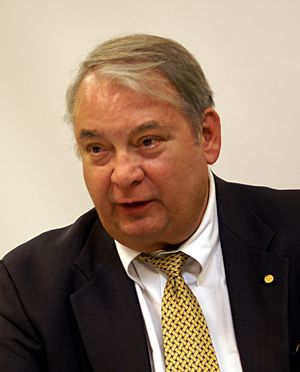Ferid Murad facts for kids
Quick facts for kids
Ferid Murad
|
|
|---|---|

Murad at a lecture in 2008
|
|
| Born | September 14, 1936 Whiting, Indiana, U.S.
|
| Died | September 4, 2023 (aged 86) Menlo Park, California, U.S.
|
| Alma mater | DePauw University (BS, 1958) and Case Western Reserve University (MD-PhD, 1965) |
| Known for | Discoveries concerning cyclic GMP as a signaling molecule in the cardiovascular system |
| Spouse(s) | Carol A. Leopold |
| Children | 5 |
| Awards | Nobel Prize in Physiology or Medicine (1998) and the Albert Lasker Award for Basic Medical Research (1996) |
| Scientific career | |
| Fields | Biochemistry, Pharmacology |
| Institutions | University of Virginia (1970–81), Stanford University (1981–88), Northwestern University (1988–1998), Abbott Laboratories (1988–93), University of Texas Medical School at Houston (1997–2011), George Washington University (2011–2017), Palo Alto VA Medical Center (2017-20??) |
| Doctoral advisor | Earl Sutherland, Jr. and Theodore Rall |
Ferid Murad (September 14, 1936 – September 4, 2023) was an American doctor and scientist. He won the Nobel Prize in Physiology or Medicine in 1998. He was recognized for his important discoveries about how our bodies use a special molecule called nitric oxide to send signals.
Contents
Early Life and Interests
Ferid Murad was born in Whiting, Indiana, on September 14, 1936. His father, John Murad, was an Albanian immigrant. His mother was Henrietta Josephine Bowman. Ferid was the oldest of three brothers. Growing up, he spent a lot of time helping at his family's small restaurant.
When he was in eighth grade, Ferid had to write about his top three career choices. He picked doctor, teacher, and pharmacist. This showed his early interest in medicine and helping people. He later became a certified doctor and researcher.
Education and Training
Ferid Murad earned a scholarship to DePauw University in Indiana. He studied chemistry there and finished his degree in 1958. During his last year, his professors suggested he look into a new program. This program let students earn both a medical degree (MD) and a PhD in science at the same time.
He decided to join this special MD-PhD program at Case Western Reserve University. He was one of the first students to complete this combined degree. He earned both his MD and PhD in 1965. After that, he did more training at hospitals, including Massachusetts General Hospital.
A Career in Science
Murad started his teaching and research career at the University of Virginia in 1970. He became a full professor there in 1975. Later, he moved to Stanford University in 1981. He also worked at Abbott Laboratories, a big pharmaceutical company. In 1993, he even started his own company.
In 1997, Murad went back to working at universities. He joined the University of Texas Health Science Center at Houston. Later, in 2011, he became a professor at George Washington University.
Discovering How Our Bodies Signal
Ferid Murad's most important research was about how certain medicines work. He found that drugs like nitroglycerin release something called nitric oxide in the body. This nitric oxide helps to relax muscles, especially in the heart and blood vessels. It does this by increasing a molecule called cyclic GMP inside cells.
His discoveries helped other scientists, Robert F. Furchgott and Louis J. Ignarro, understand the full process. Because of this groundbreaking work, Ferid Murad, Robert Furchgott, and Louis Ignarro shared the 1998 Nobel Prize in Physiology or Medicine. Murad and Furchgott also received the Albert Lasker Award for Basic Medical Research in 1996.
Beyond the Lab
In 2015, Murad signed the Mainau Declaration on Climate Change. This important document was signed by many Nobel Prize winners. It called for action on climate change and was given to the President of France. This happened before a big meeting in Paris about climate change.
Ferid Murad also worked on editing a series of books about herbal medicine.
Death
Ferid Murad passed away in Menlo Park, California, on September 4, 2023. He was 86 years old.
Awards and Recognitions
- Albert Lasker Award for Basic Medical Research
- American Academy of Achievement
- American Heart Association, Ciba Award
- National Academy of Sciences
- Nobel Prize
See also
 In Spanish: Ferid Murad para niños
In Spanish: Ferid Murad para niños
- List of Case Western people
 | Jessica Watkins |
 | Robert Henry Lawrence Jr. |
 | Mae Jemison |
 | Sian Proctor |
 | Guion Bluford |

